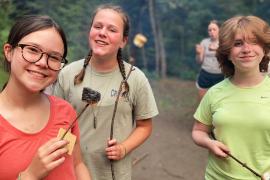In the summer of 2013, we faced an exciting and critical challenge at our camp — a major leadership transition. We had the chance to replace our boys' camp director, who had been with us for seven years, with a man named Erec Hillis. Of course, seven years is not a lot compared to the twenty-one my wife Susie and I have been executive directors or the forty-eight years the camp has existed. But seven years is longer than all but a small handful of campers or counselors had even been with us, so the outgoing director was the only one who most of our camp families had ever known.
With this in mind, seven years is a lifetime.
Replacing a director is a daunting task. After all, camp is as much about people as it is programs, facilities, or traditions. Camp begins and ends with relationships. It has long been said among experienced camp professionals that, with the right people, you can run a great camp on an acre of asphalt. Getting "the right people" is important; getting the right leadership is critical.
Making a change in leadership is a bit scary. We put a great deal of thought and time into making the transition successful. This article is one of two describing some of the lessons we learned from the experience, one from the executive director point of view (this article) and one from the new director's perspective (Erec Hillis' article).
Here is what I learned about facilitating a successful transition of a director. I believe these guidelines will be helpful with any important transition, including assistant directors, program directors, etc.
1. Manage the Emotional Transition
Camp communities often resist change, particularly with respect to longtime leaders. Our communities tend to love the people with whom we work, and we hate to see them leave. We miss them. Further, the idiosyncrasies of a director soon become like camp traditions. The mere fact that a new director is different from his or her predecessor is a challenge. The campers and counselors tend to confuse the unique behaviors of an individual with the job itself. This resistance to change creates a management challenge.
This resistance to change can manifest itself in odd ways, especially with regard to leadership. Roughly a decade ago, we had a girls' camp director of seventeen years leave to be with her ailing mother. She was one of the most high-energy individuals I have ever met. Everything she did was over the top. She made every announcement with extreme enthusiasm. She darted from activity to activity with endless vigor. She was like a hummingbird but not quite as mellow.
After she left, Susie (my wife) decided that she would step in as the girls' camp director. Susie is wise, loving, and patient. Our campers now see her as a second mother and adore her. But the first year she replaced the prior girls' camp director, she encountered substantial resistance from the returning campers and counselors. She was, well, different. Her announcement style was soothing, but they believed that the "right" style was more frenetic. Rather than dart from place to place, she engaged campers and counselors one-on-one under a tree or at our home.
Of course, today no one can imagine anyone other than Susie as the "camp mom," but that first year was difficult. It was also informative. Since then, we have focused on managing the emotional transition between leaders:
- We avoided direct comparisons to the predecessor. When asked, "Who will replace [the previous director]," I answered simply, "No one. You can never replace someone who was cherished at camp. Instead, we are bringing in a new and talented person to help our community grow and thrive."
- We set Erec up for multiple successes and celebrated each one publicly. The goal was to change the narrative of our camp population from "Erec is not the same as his predecessor and that is bad" to "He is really adding a great deal to our community, and we are lucky to have him."
- We personally asked key influencers in our community to support the transition. Every camp has a cadre of unofficial leaders who help frame the opinions of others. These individuals are also generally the ones most likely to struggle with any change in official leadership. Both Susie and I spent oneon- one time with many of the most respected returning counselors and staff members. We asked for their help with the change. We knew that our informal leaders loved our camp and were unsure of the change. By spending time with many of them, we planted two critical ideas: 1) their leadership was important and 2) camp needed them to be part of the solution. Through this effort, these individuals became advocates for change rather than barriers to the transition.
2. Reassign Tasks
Experience allows us to do more work in a shorter period of time. As a result, you cannot expect a new director to do all the tasks done by a predecessor. To do so is to set up a new leader for failure. We decided to reassign tasks among our team so that more experienced team members could take on more responsibility while Erec took on less while he learned his new position.
We began by making a list of all the tasks and responsibilities of the previous director. We asked multiple people to write down what they thought the job description had been. Getting several people to create lists helped ensure that our list was as comprehensive as possible.
After the list was complete, we broke up the tasks into two piles: those tasks that Erec needed to do and those that we could assign to someone else. When looking at this breakdown, we kept the following in mind:
- What are Erec's strengths? As previously noted, we wanted to help him succeed in the eyes of our camp community. We knew that some tasks would come naturally to him and provide for some easy victories. We gave him every such task. Success also helped foster his own confidence, which made him more effective leading others.
- What tasks are most important and/or visible to the counselors? Teams are best when the team members like the leader and know that leader cares for them. Assigning the new director the tasks that matter to the staff can help this happen. For example, when a group of summer-long counselors (twelve weeks) asked for some additional time off at the end of the summer, the new director was part of the two-person team who made it happen and then announced it to the counselors.
- What tasks are most important to the campers? Getting the campers excited about the camp's leadership is also important to success. Once again, it was important to keep Erec's skillset in mind. In his case, he shines more with intimate groups than in front of the entire camp (at least compared to his predecessor). Knowing this, we created some time with each cabin and de-emphasized the public performances, giving the public moments to other leaders who craved the spotlight. These cabin interactions gave him a positive identity with the campers — providing the credibility he needed to deal with the inevitable cabin issues he would face later.
- When we assigned tasks to other people, we focused on choosing who on the team would most appreciate and thrive doing them. To continue the preceding example, in letting other people share the spotlight at camp-wide events, we not only reduced his load, but we also increased the support from those individuals who helped by taking center stage.
- Of course, not everyone embraced the reassigned tasks they were given, but as long as we emphasized the fact that the change was critical to the camp's mission, we found everyone was willing to help.
We were fortunate that Erec is highly organized, so we did not need to reassign many administrative tasks. Typically, this will not be the case. Administrative tasks often require experience but are low visibility, so they are usually prime for reassignment. The goal is to help your director succeed, so it is worth reducing the administrative load to free up time for your community.
3. Ego Is the Enemy
Ever y summer we experience great triumphs and make tons of minor mistakes. As executive directors, my wife and I decided that we would credit Erec with all the triumphs and take the blame for all the mistakes. Sometimes this can be difficult. Typically, people try to find ways to deflect blame. We planned to embrace it.
This was occasionally hard on our egos. But our egos are not as important as our mission.
Even experienced teams make mistakes, but when a new leader makes one, people often assume that inexperience is the reason. For example, we could forget to recognize a counselor's birthday during orientation. If this error happens under an experienced team, counselors might simply think, "These things happen." Under a new director, he or she is likely to get the blame ("the old director would never do that").
In such a case, we made a point of owning the mistake, even if the error was not actually ours. We have years of experience that gives us credibility and grace with the staff. Erec needed to earn his credibility. Helping build it up in the eyes of the staff was vital.
When we experienced success in a great new activity or special event, we celebrated together and highlighted Erec's role in the project.
In short, we committed ourselves to transferring our credibility to him. Our place in the community was firmly established, so we could absorb blame. Erec, on the other hand, still needed to earn the love and admiration of our extended camp family.
Rewards
Our efforts required a substantial amount of planning before camp and execution during the summer. The rewards were worth it. The transition was successful. Our community embraced Erec and camp thrived. We have now completed a second — more normal and even more successful — summer with our new director.
Photo courtesy of Blue Star Camps, Hendersonville, North Carolina.
Steve and his wife, Susie, are the executive directors of Camp Champions. He is also a partner at Everwood Day Camp and Camp Pinnacle. Steve currently serves on the ACA national board and blogs for Psychology Today on youth development. Visit Camp Champions at www.campchampions.com.
Originally published in the 2014 September/October Camping Magazine.



